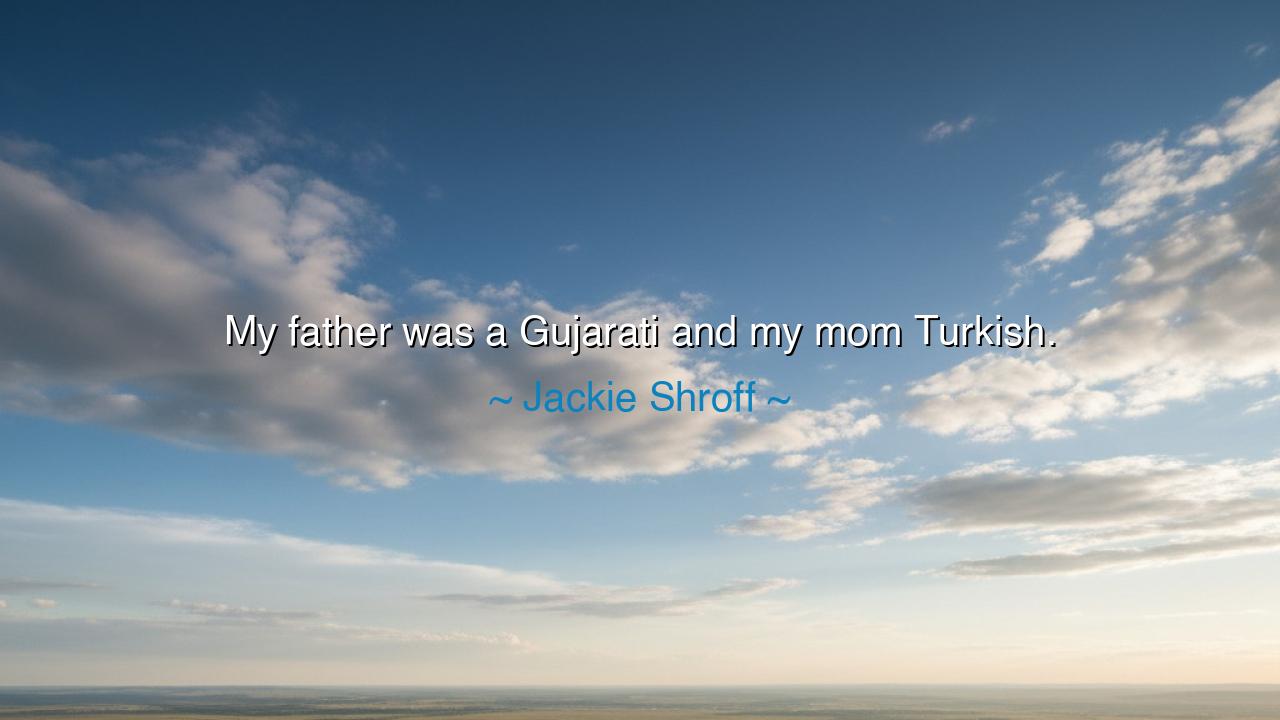
My father was a Gujarati and my mom Turkish.






“My father was a Gujarati and my mom Turkish.” — Jackie Shroff
In this brief yet profound statement, Jackie Shroff does more than trace his lineage — he speaks to the eternal truth of heritage, harmony, and identity. His words, spoken simply, carry the resonance of two worlds united by love. “My father was a Gujarati and my mom Turkish” — within this sentence lives a bridge between nations, between East and West, between tradition and adventure. It is the story of how two distinct rivers of culture, language, and soul converge into one life — his own. And in that union lies the ancient teaching that the human spirit is not bound by borders, but expanded by them.
To the ancients, lineage was not just a record of blood, but a map of destiny. The Gujarati, rooted in the soil of India, represent a people known for their enterprise, warmth, and endurance — traders of the world, lovers of music and spirit, seekers of prosperity through both wisdom and will. The Turkish, on the other hand, carry within their history the fire of empire, the grace of artistry, and the strength of survival across continents. When Shroff claims both, he stands as the living embodiment of cultural synthesis — proof that identity need not be singular to be strong. Like a tree drawing nourishment from two soils, he grows broader, not divided, because of his heritage.
The ancients would have seen in his parents’ union a reflection of the great migrations of the soul. For across time, love has always transcended empire, creed, and tongue. Consider the story of Antony and Cleopatra, who defied nations to be together — or Rumi, the Persian mystic whose friendship with the Turkic scholar Shams of Tabriz birthed a new language of divine love. In every era, when two worlds meet, something luminous is born — a new way of seeing, a blending of hearts that defies separation. So it was for Jackie Shroff’s family: a Gujarati father and a Turkish mother, who together crafted a life in which difference became beauty, not division.
His words also speak of rootedness and movement — of belonging to many places at once, yet being at peace in each. This is an inheritance both powerful and humbling. For those born of mixed heritage often carry not one tradition, but two — not one melody, but an entire symphony. The ancients would say that such souls are chosen for a higher understanding, capable of seeing unity where others see contrast. Through his life and art, Shroff has embodied that unity — at once rustic and refined, humble yet noble, embodying the grace of both his parents’ worlds.
But beyond heritage, there is a deeper message in his tone — a quiet reverence for family as origin, as the forge where one’s character is formed. To name one’s parents is to pay homage to the source of one’s strength. The ancients believed that each person carries the spirits of their ancestors within them, that our gestures, courage, and even our flaws are echoes of those who came before. When Jackie Shroff remembers his father and mother, he honors not just his bloodline, but the fusion of values they bestowed upon him: the Gujarati industriousness, the Turkish pride, the shared tenderness that made him who he is.
We see echoes of this truth in the story of Alexander the Great, whose father, Philip of Macedon, was a warrior of the West, and whose mother, Olympias of Epirus, came from a mystical line of priests and dreamers. From this union of reason and faith arose a man who bridged civilizations — a conqueror not just of lands, but of ideas. Similarly, Jackie Shroff’s heritage, though not one of war, carries a similar strength: the power to unite what seems separate, to embody two worlds in one being. In this way, he stands as a modern symbol of cultural unity, a reminder that diversity is not fracture but fullness.
And so, the lesson unfolds like an ancient parable: embrace every thread that weaves your identity. Do not shrink from your mixed roots, your blended origins, your dual or multiple selves. For each part of your heritage adds color to your soul’s tapestry. Learn your languages. Honor your ancestors. Celebrate the contrasts within you — for they are not contradictions, but harmonies waiting to be sung. As Jackie Shroff’s life reminds us, the union of cultures, when embraced with humility and pride, births not confusion, but wholeness.
Thus, let this wisdom be passed down: your lineage is your story, your parents are your beginning, and your identity is the song they started that you must continue. Be proud of every part of yourself — the Gujarati and the Turkish, the east and the west, the earth and the sky within you. For in the blending of bloodlines, the ancients saw not division, but destiny — and in the heart that carries many homes, the world itself finds its peace.






AAdministratorAdministrator
Welcome, honored guests. Please leave a comment, we will respond soon